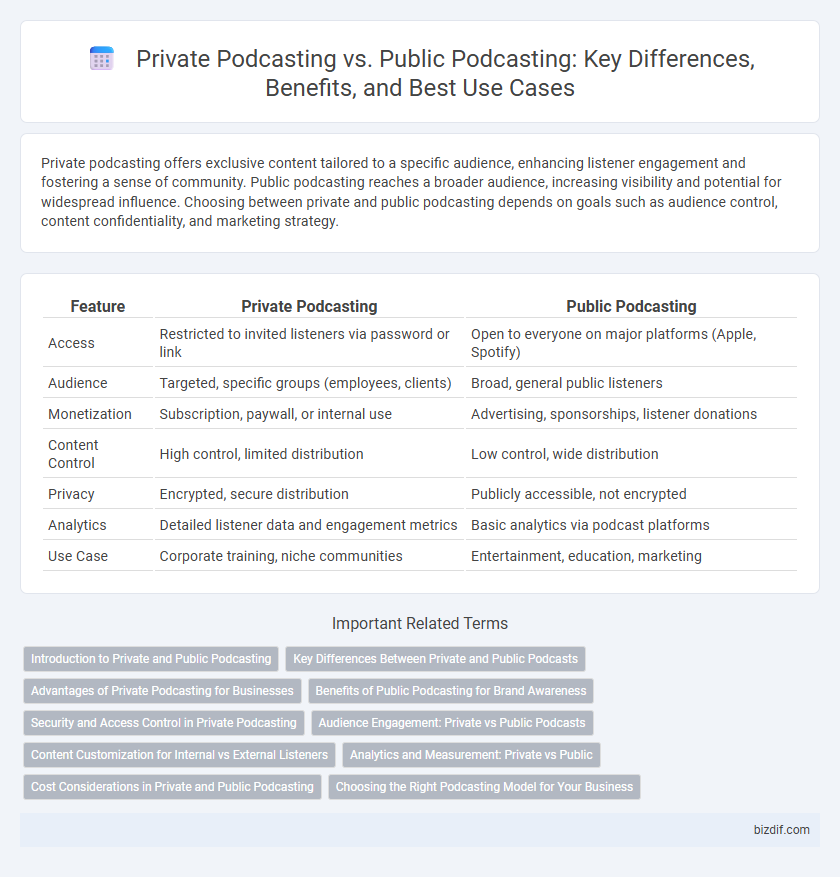Private podcasting offers exclusive content tailored to a specific audience, enhancing listener engagement and fostering a sense of community. Public podcasting reaches a broader audience, increasing visibility and potential for widespread influence. Choosing between private and public podcasting depends on goals such as audience control, content confidentiality, and marketing strategy.
Table of Comparison
| Feature | Private Podcasting | Public Podcasting |
|---|---|---|
| Access | Restricted to invited listeners via password or link | Open to everyone on major platforms (Apple, Spotify) |
| Audience | Targeted, specific groups (employees, clients) | Broad, general public listeners |
| Monetization | Subscription, paywall, or internal use | Advertising, sponsorships, listener donations |
| Content Control | High control, limited distribution | Low control, wide distribution |
| Privacy | Encrypted, secure distribution | Publicly accessible, not encrypted |
| Analytics | Detailed listener data and engagement metrics | Basic analytics via podcast platforms |
| Use Case | Corporate training, niche communities | Entertainment, education, marketing |
Introduction to Private and Public Podcasting
Private podcasting offers controlled access, allowing creators to distribute content exclusively to a selected audience, enhancing confidentiality and tailored communication. Public podcasting provides open accessibility, maximizing reach and engagement across diverse listener demographics through platforms like Apple Podcasts and Spotify. Both formats serve distinct purposes in content strategy, balancing audience growth with privacy needs.
Key Differences Between Private and Public Podcasts
Private podcasts offer controlled access, making content available only to a specific audience through authentication or invitation, which enhances exclusivity and security. Public podcasts are freely accessible on platforms like Apple Podcasts or Spotify, allowing creators to reach a broad, diverse audience without restrictions. Key differences include distribution methods, audience reach, content monetization potential, and privacy levels, with private podcasts being ideal for internal communications or premium content.
Advantages of Private Podcasting for Businesses
Private podcasting offers businesses enhanced control over content distribution, ensuring sensitive information reaches only authorized employees or clients. This exclusivity fosters a secure communication channel, boosting engagement and internal training effectiveness. By limiting audience access, companies can tailor messages to specific groups, increasing relevance and driving stronger brand loyalty and collaboration.
Benefits of Public Podcasting for Brand Awareness
Public podcasting significantly enhances brand awareness by reaching a broad, diverse audience, increasing visibility across various platforms such as Spotify, Apple Podcasts, and Google Podcasts. It fosters organic growth through listener engagement and social sharing, boosting SEO rankings and driving traffic to the brand's website. High-quality public podcasts establish authority in the industry, build trust with potential customers, and create lasting brand recognition.
Security and Access Control in Private Podcasting
Private podcasting offers enhanced security by restricting access exclusively to authorized listeners through password protection, secure links, or authentication protocols. Unlike public podcasting, which exposes content to anyone on the internet, private podcasts utilize encryption and controlled distribution methods to safeguard sensitive information and personal data. This access control ensures that proprietary or confidential episodes remain confidential, making private podcasting ideal for corporate training, internal communications, and premium content delivery.
Audience Engagement: Private vs Public Podcasts
Private podcasting enables targeted audience engagement by restricting access to specific listeners, fostering a sense of exclusivity and higher interaction rates. Public podcasts reach a broader audience but often experience diluted engagement due to diverse listener interests and limited personalization. By tailoring content and delivery in private podcasts, creators achieve deeper connections and improved listener loyalty.
Content Customization for Internal vs External Listeners
Private podcasting enables businesses to tailor content specifically for internal teams, focusing on confidential updates, training, and company culture that drive employee engagement and alignment. Public podcasting targets external audiences such as customers or industry followers, emphasizing brand awareness and thought leadership with broadly appealing, polished episodes. Content customization in private podcasts often includes sensitive information and interactive elements, while public podcasts prioritize accessibility, SEO optimization, and wide distribution across major platforms.
Analytics and Measurement: Private vs Public
Private podcasting provides detailed listener analytics such as individual user engagement, download frequency, and listening duration, enabling precise measurement of audience behavior and content effectiveness. Public podcasting offers broader but less granular metrics, typically aggregated data like total downloads, geographic distribution, and platform rankings. The enhanced analytics in private podcasting facilitate targeted marketing strategies and audience retention efforts that public podcasting metrics cannot achieve.
Cost Considerations in Private and Public Podcasting
Private podcasting often involves higher costs due to secure hosting, subscription management, and restricted access technology, whereas public podcasting typically incurs lower expenses with free distribution platforms and broad audience reach. Monetization in private podcasting relies on paid subscriptions or exclusive content fees, increasing revenue potential but also operational complexity. Public podcasting benefits from wider advertising opportunities and sponsorship deals but faces more competition and less control over content access.
Choosing the Right Podcasting Model for Your Business
Private podcasting offers businesses enhanced control over content distribution, ensuring secure access for targeted audiences such as employees or premium customers. Public podcasting maximizes reach and brand exposure by making episodes available to a broad audience through popular platforms like Spotify and Apple Podcasts. Selecting the right model depends on goals like audience engagement, content sensitivity, and marketing strategy, balancing exclusivity with potential growth opportunities.
Private Podcasting vs Public Podcasting Infographic

 bizdif.com
bizdif.com